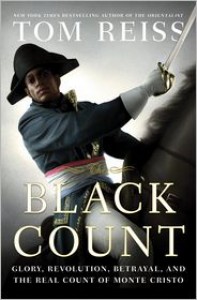
Anyone who wonders where Alexandre Dumas (pere) got the inspiration for such classic tales as "The Three Musketeers" and (most particularly) "The Count of Monte Cristo" need look no further than this book. The concepts were drawn from the real-life exploits of Dumas' father, Thomas-Alexandre Antoine Davy, Marquis de la Pailleterie: the man who called himself simply Alex Dumas.The son of a slave and a fugitive nobleman, Dumas started out life on the island of Saint-Domingue (modern-day Haiti) before working his way across to France to seek out his father and his fortune. He entered France during a fortuitous time for people of color, for the French Republic had done away with slavery and people of color had the same rights as all other citizens. Dumas made a name for himself in the military and eventually became General of the Armies ... before being removed from command by his one-time subordinate, one Napoleon Bonaparte, who eventually undid a great deal of the equality-related work of the Republicans.This is not a pretty time in France, of course, with the Reign of Terror and its aftermath happening. Yet, Alex Dumas does well for himself during a time when the deck should have been stacked against him as a nobleman, despite his Republican sensibilities.The book details Dumas' time in the French Revolution, Franco-Italian and Mameluke wars; it is during his return from the latter that he is captured and imprisoned for two years without anyone knowing where he has gone (the inspiration for "The Count of Monte Cristo"). His soldierly exploits, skills as a fencer and horseman, and his overall persona are documented with contemporary letters, among other sources.This book is impeccably researched (the notes and biography comprise more than 100 pages), and about as far from a dry military history tome as one might imagine. Highly recommended for those interested in France, military history, Napoleon's conquests and, yes, the novels of Alexandre Dumas (pere).(Review based on uncorrected advance proof.)
 Anyone who wonders where Alexandre Dumas (pere) got the inspiration for such classic tales as "The Three Musketeers" and (most particularly) "The Count of Monte Cristo" need look no further than this book. The concepts were drawn from the real-life exploits of Dumas' father, Thomas-Alexandre Antoine Davy, Marquis de la Pailleterie: the man who called himself simply Alex Dumas.The son of a slave and a fugitive nobleman, Dumas started out life on the island of Saint-Domingue (modern-day Haiti) before working his way across to France to seek out his father and his fortune. He entered France during a fortuitous time for people of color, for the French Republic had done away with slavery and people of color had the same rights as all other citizens. Dumas made a name for himself in the military and eventually became General of the Armies ... before being removed from command by his one-time subordinate, one Napoleon Bonaparte, who eventually undid a great deal of the equality-related work of the Republicans.This is not a pretty time in France, of course, with the Reign of Terror and its aftermath happening. Yet, Alex Dumas does well for himself during a time when the deck should have been stacked against him as a nobleman, despite his Republican sensibilities.The book details Dumas' time in the French Revolution, Franco-Italian and Mameluke wars; it is during his return from the latter that he is captured and imprisoned for two years without anyone knowing where he has gone (the inspiration for "The Count of Monte Cristo"). His soldierly exploits, skills as a fencer and horseman, and his overall persona are documented with contemporary letters, among other sources.This book is impeccably researched (the notes and biography comprise more than 100 pages), and about as far from a dry military history tome as one might imagine. Highly recommended for those interested in France, military history, Napoleon's conquests and, yes, the novels of Alexandre Dumas (pere).(Review based on uncorrected advance proof.)
Anyone who wonders where Alexandre Dumas (pere) got the inspiration for such classic tales as "The Three Musketeers" and (most particularly) "The Count of Monte Cristo" need look no further than this book. The concepts were drawn from the real-life exploits of Dumas' father, Thomas-Alexandre Antoine Davy, Marquis de la Pailleterie: the man who called himself simply Alex Dumas.The son of a slave and a fugitive nobleman, Dumas started out life on the island of Saint-Domingue (modern-day Haiti) before working his way across to France to seek out his father and his fortune. He entered France during a fortuitous time for people of color, for the French Republic had done away with slavery and people of color had the same rights as all other citizens. Dumas made a name for himself in the military and eventually became General of the Armies ... before being removed from command by his one-time subordinate, one Napoleon Bonaparte, who eventually undid a great deal of the equality-related work of the Republicans.This is not a pretty time in France, of course, with the Reign of Terror and its aftermath happening. Yet, Alex Dumas does well for himself during a time when the deck should have been stacked against him as a nobleman, despite his Republican sensibilities.The book details Dumas' time in the French Revolution, Franco-Italian and Mameluke wars; it is during his return from the latter that he is captured and imprisoned for two years without anyone knowing where he has gone (the inspiration for "The Count of Monte Cristo"). His soldierly exploits, skills as a fencer and horseman, and his overall persona are documented with contemporary letters, among other sources.This book is impeccably researched (the notes and biography comprise more than 100 pages), and about as far from a dry military history tome as one might imagine. Highly recommended for those interested in France, military history, Napoleon's conquests and, yes, the novels of Alexandre Dumas (pere).(Review based on uncorrected advance proof.)



